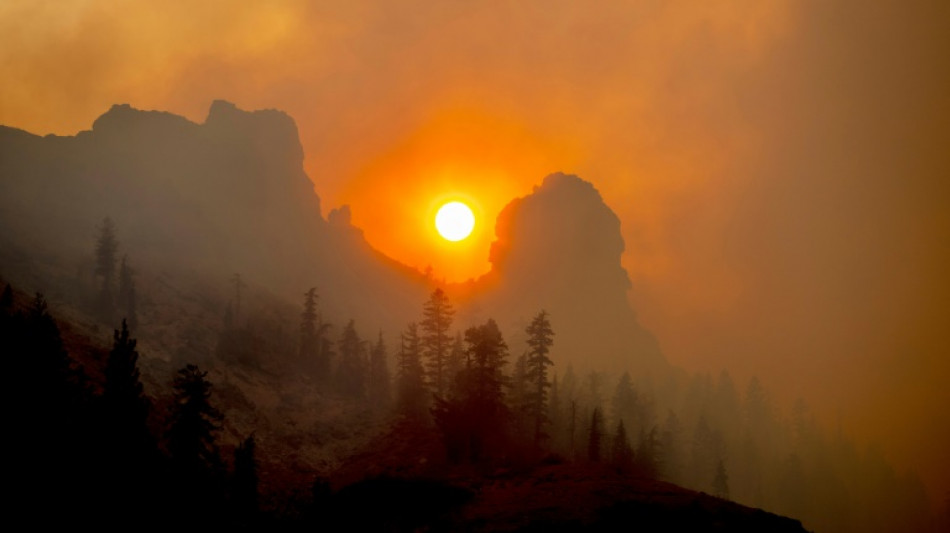
-
 UK's Starmer offers 'plan for change' in reset bid after 150 days
UK's Starmer offers 'plan for change' in reset bid after 150 days
-
South Korea president clings to power after martial law U-turn

-
 Presidential vote seen as referendum on Romania's European future
Presidential vote seen as referendum on Romania's European future
-
Hamilton bids farewell to Mercedes as Ferrari vie for title

-
 New Zealand unchanged in bid to hit back against England
New Zealand unchanged in bid to hit back against England
-
Macron seeks remedy to France's political crisis

-
 New Natalia Lafourcade album celebrates music's onstage evolutions
New Natalia Lafourcade album celebrates music's onstage evolutions
-
Taiwan's Lai kicks off visit to US territory Guam

-
 Ivory Coast staple cassava meal gains UNESCO heritage status
Ivory Coast staple cassava meal gains UNESCO heritage status
-
OpenAI to partner with military defense tech company

-
 Liverpool held but Slot salutes 'special' Salah
Liverpool held but Slot salutes 'special' Salah
-
Man City needed to break losing 'routine', says Guardiola

-
 Leipzig down Frankfurt to reach German Cup quarters, Cologne strike late
Leipzig down Frankfurt to reach German Cup quarters, Cologne strike late
-
Mbappe admits penalty miss 'big mistake' as Bilbao beat Real Madrid

-
 'Sad, disappointed' Mbappe pays penalty as Bilbao beat Real Madrid
'Sad, disappointed' Mbappe pays penalty as Bilbao beat Real Madrid
-
US stocks surge to records, shrugging off upheaval in South Korea, France

-
 Liverpool held in Newcastle thriller, Arsenal inflict Amorim's first defeat
Liverpool held in Newcastle thriller, Arsenal inflict Amorim's first defeat
-
Shiffrin confirms she'll miss Beaver Creek World Cup races

-
 Corner kings Arsenal beat Man Utd to close gap on Liverpool
Corner kings Arsenal beat Man Utd to close gap on Liverpool
-
Mbappe pays penalty as Bilbao beat Real Madrid

-
 NFL Jaguars place Lawrence on injured reserve with concussion
NFL Jaguars place Lawrence on injured reserve with concussion
-
North Korea, Russia defence treaty comes into force

-
 Openda hits brace as Leipzig beat Frankfurt in German Cup last 16
Openda hits brace as Leipzig beat Frankfurt in German Cup last 16
-
Schar punishes Kelleher blunder as Newcastle hold Liverpool in thriller

-
 De Bruyne masterclass helps Man City end seven-game winless streak
De Bruyne masterclass helps Man City end seven-game winless streak
-
Syrian rebels surround Hama 'from three sides', monitor says

-
 Lawyers seek leniency for France rape trial defendants, blaming 'wolf' husband
Lawyers seek leniency for France rape trial defendants, blaming 'wolf' husband
-
OpenAI chief 'believes' Musk will not abuse government power

-
 Thousands rally in Georgia after police raid opposition offices
Thousands rally in Georgia after police raid opposition offices
-
S. Korea opposition push to impeach president

-
 Powell 'not concerned' US Fed would lose independence under Trump
Powell 'not concerned' US Fed would lose independence under Trump
-
French government falls in historic no-confidence vote

-
 Syrian White Helmets chief 'dreams' of never pulling a body out of rubble again
Syrian White Helmets chief 'dreams' of never pulling a body out of rubble again
-
NBA Suns lose Durant for at least a week with ankle injury

-
 Warhammer maker Games Workshop enters London's top stocks index
Warhammer maker Games Workshop enters London's top stocks index
-
Iran Nobel winner released for three weeks, 'unconditional' freedom urged

-
 Red Cross marks record numbers of humanitarians killed in 2024
Red Cross marks record numbers of humanitarians killed in 2024
-
Johnson's Grand Slam 'no threat', says World Athletics boss Coe

-
 Qatar's emir and UK's Starmer talk trade as state visit ends
Qatar's emir and UK's Starmer talk trade as state visit ends
-
Cuba suffers third nationwide blackout in two months

-
 Russia, Ukraine to send top diplomats to OSCE summit in Malta
Russia, Ukraine to send top diplomats to OSCE summit in Malta
-
Spanish royals to attend memorial service for flood victims

-
 LPGA, USGA new policy requires female at birth or pre-puberty change
LPGA, USGA new policy requires female at birth or pre-puberty change
-
Stick to current climate change laws, US tells top UN court

-
 British Museum chief says Marbles deal with Greece 'some distance' away
British Museum chief says Marbles deal with Greece 'some distance' away
-
Pope Francis receives electric popemobile from Mercedes

-
 Gaza civil defence: thousands flee Israeli strikes, evacuation calls
Gaza civil defence: thousands flee Israeli strikes, evacuation calls
-
Trump names billionaire private astronaut as next NASA chief

-
 Pidcock to leave INEOS Grenadiers at end of season
Pidcock to leave INEOS Grenadiers at end of season
-
Seoul stocks weaken, Paris advances despite political turmoil


California wildfire pollution killed 52,000 in a decade: study
Pollution from California wildfires killed more than 52,000 people in a decade, a new study claimed Friday, as the western United States girds for a hot summer that could bring more blazes.
Vast areas of forest and grassland are scorched every year in California and other parts of the country, causing millions of dollars of destruction and sometimes costing lives.
But researchers say particulate matter released by the fires has a devastating effect on local populations that far outweighs the number of deaths directly attributable to them.
A study led by Rachel Connolly of the University of California Los Angeles found these tiny airborne pollutants -- known as PM2.5 because they are 2.5 micrometers or less -- are killing large numbers of people.
The team looked at data from 2008 to 2018 and isolated the amount of PM2.5 released specifically by wildfires, as opposed to that generated by other sources, like transport and manufacturing.
They found at least 52,480 premature deaths could be attributed to this specific pollution. The cost of treating people affected by the pollutants was calculated at $432 billion.
"The importance of wildfire management will only grow in the coming decades as aridification intensifies with climate change and more regions are susceptible to fires," the researchers wrote in their paper, published Friday by Science Advances, a peer-reviewed journal of The American Association for the Advancement of Science.
"These findings have direct implications for California, a state at the forefront of climate policy development with many fire-prone regions and a diverse population to protect," they added.
"Growing the evidence base on health impacts from wildfires and other climate-related exposures is critical."
The study comes as much of California and other parts of the American West are sweltering under the first heatwave of the year.
Temperatures as high as 120 degrees Fahrenheit (49 Celsius) scorched Death Valley on Thursday, while Las Vegas was broiling under 111 F heat.
The early summer heatwave has raised concerns that the fire season could be a fierce one in 2024 after two relatively benign years, thanks to wet winters.
For now, the blazes breaking out have tended to be grass fires, which are easier to control and do not burn as hot.
But as the summer heats up and the larger shrubs and trees start to dry out, they become vulnerable to downed power lines or discarded cigarettes.
After around 20 years of drought, and in a climate that is slowly aridifying, California has seen an alarming number of megafires this century -- 18 of the 20 biggest fires in the state's recorded history have occurred in the last two decades.
Wildfires are a natural -- and necessary -- part of the life cycle of wilderness.
But climate change, caused by humanity's unchecked burning of fossil fuels that pumps greenhouse gases into the atmosphere, is making them bigger, hotter and more unpredictable.
P.Anderson--BTB




